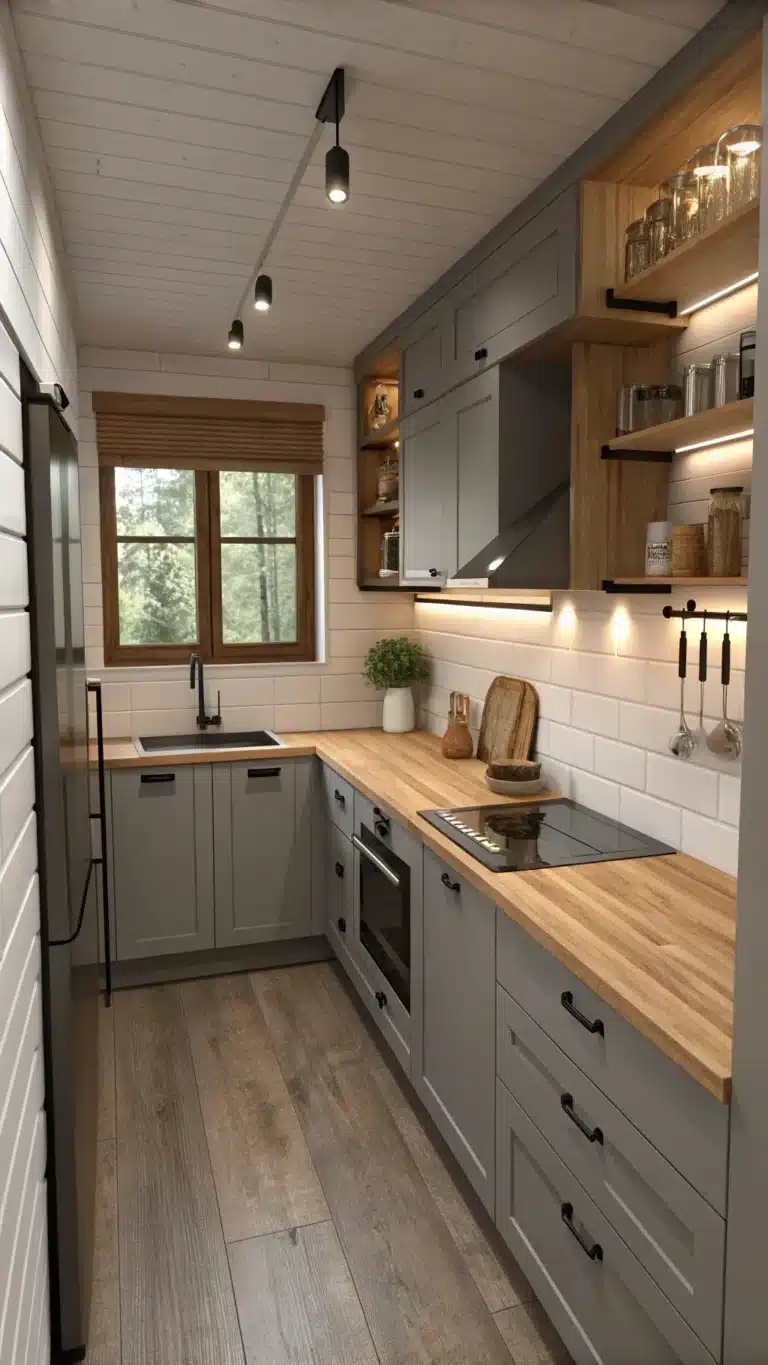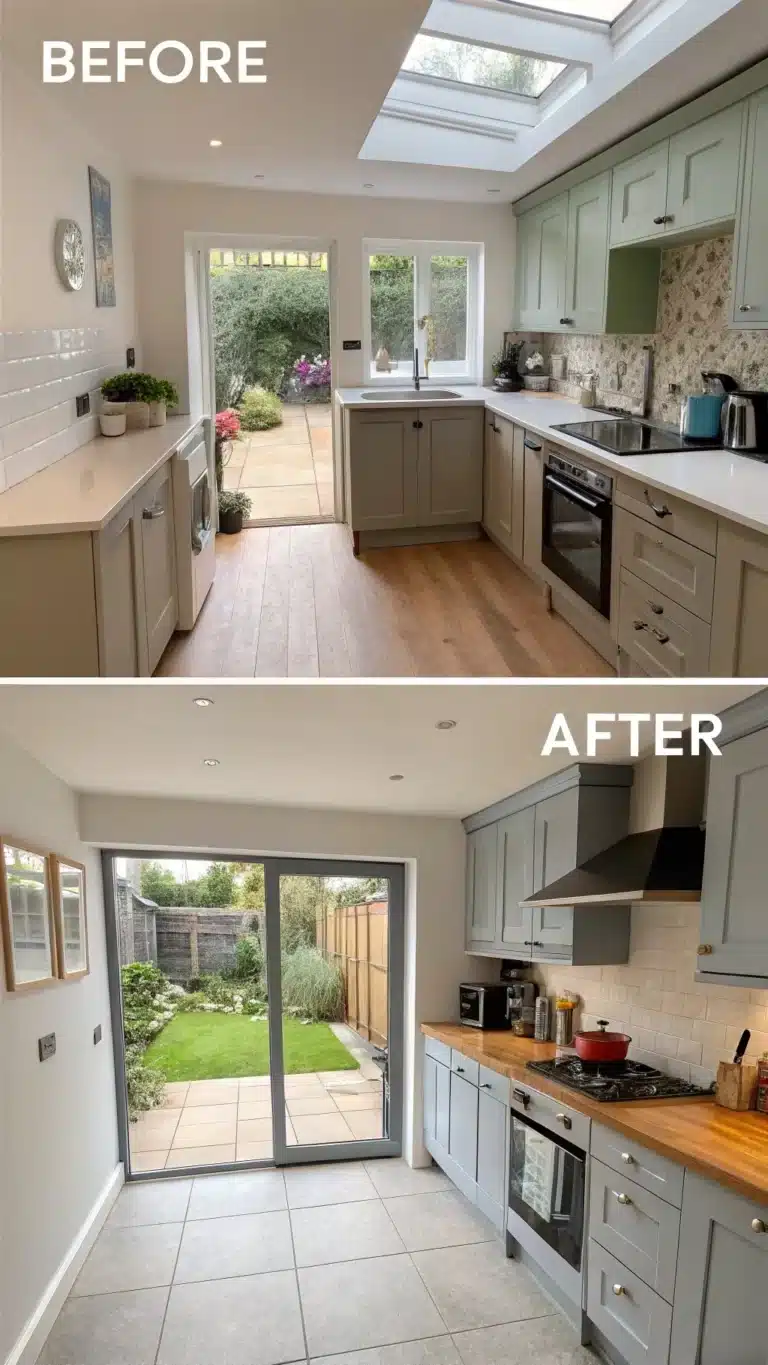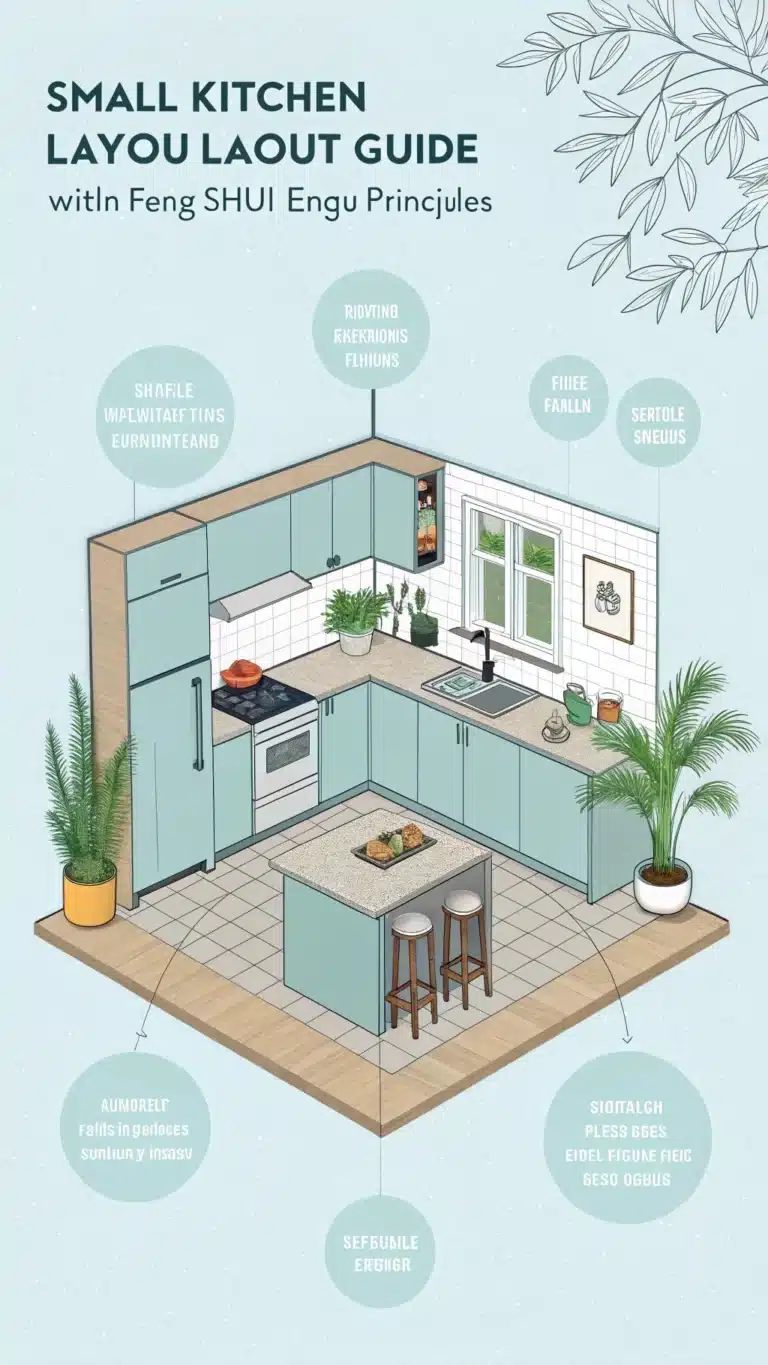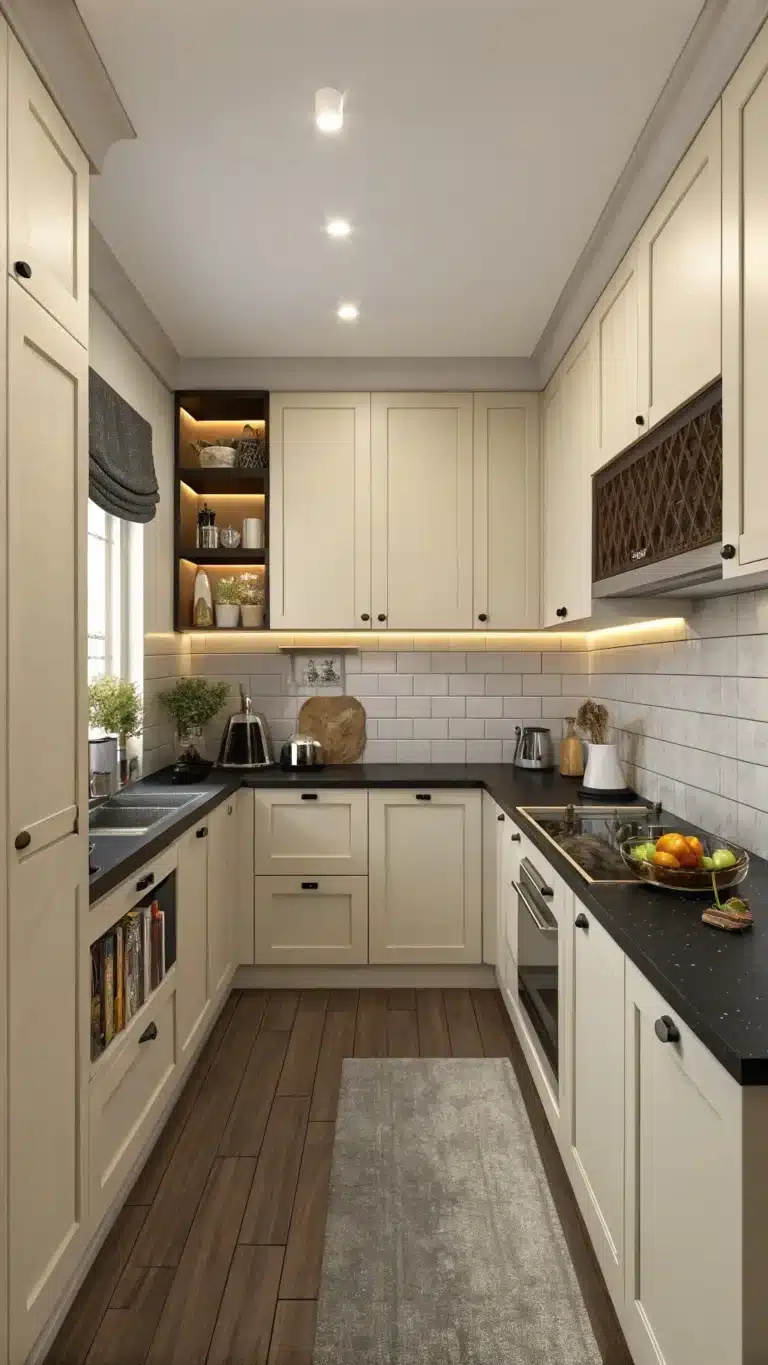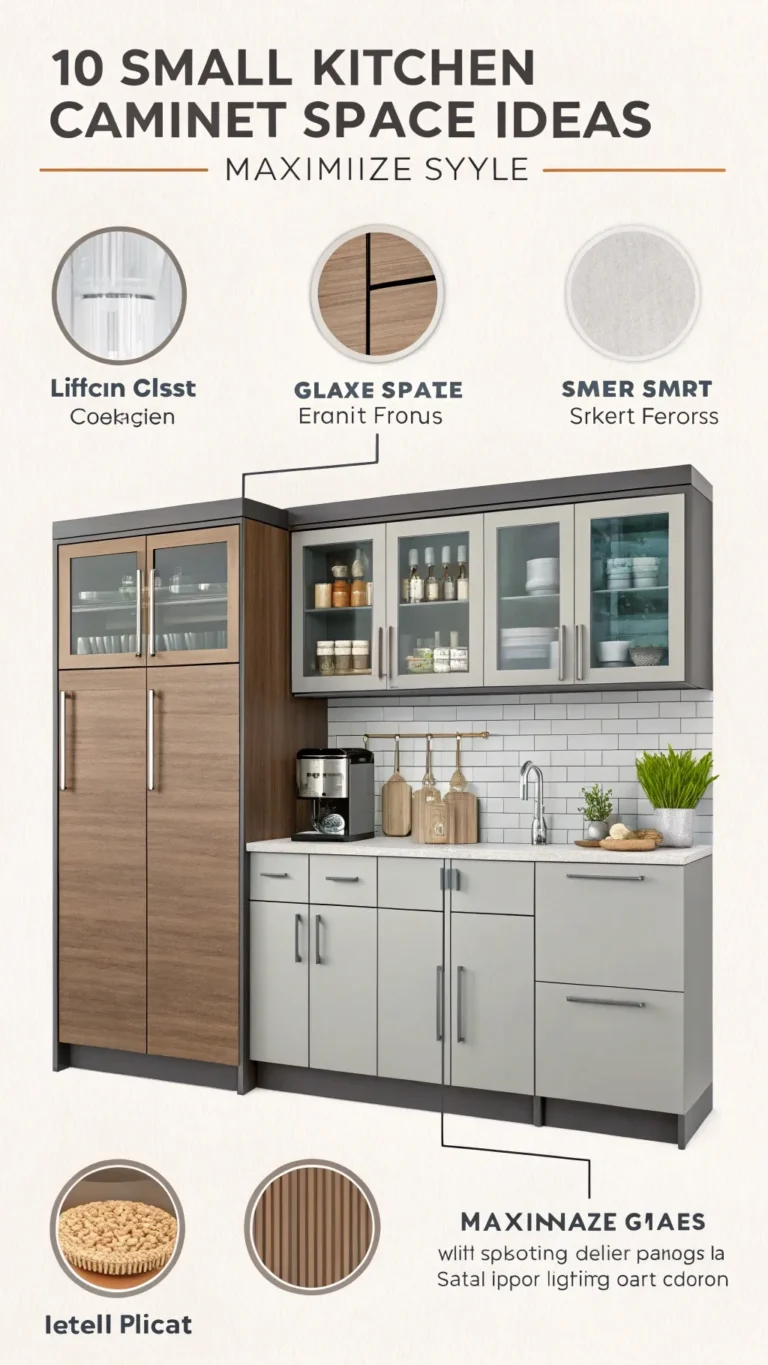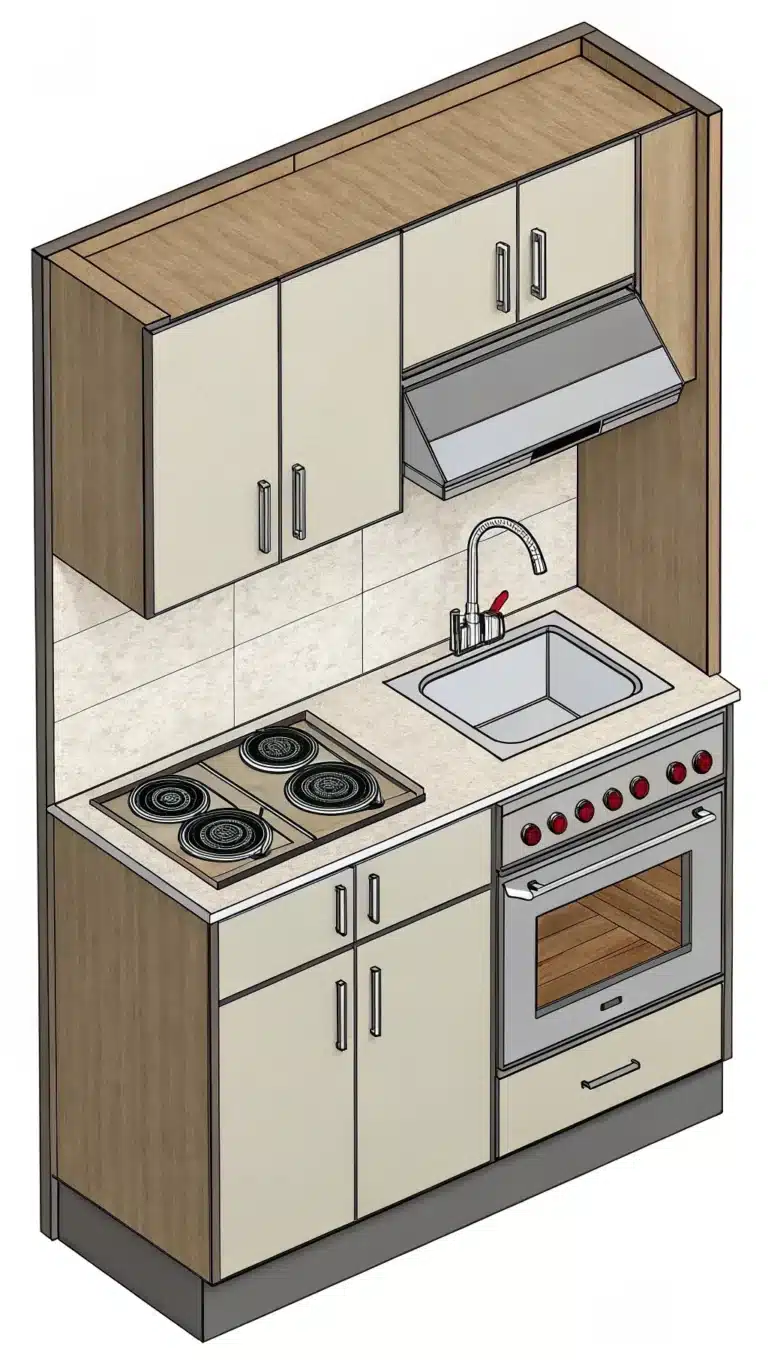1. Introduction
Small kitchens feel cramped and frustrating. Limited counter space and storage make cooking a challenge. A lack of flow slows you down and creates clutter. Many think renovating small kitchens means a big budget or compromise in style. This is not true.
Careful planning and smart design create a kitchen that works better and looks inviting. This guide shares 10 expert tips for a successful small kitchen renovation. You’ll learn how to maximize every inch, improve functionality, and add style without overspending.
We cover smart layouts, clever storage, stylish design, right appliances, and budget-friendly ideas that work well in 2025. Even renters and DIY beginners can use these tips to create a kitchen they love.
Many experts advise that small kitchens demand more thought than large kitchens. Architect and designer Sarah Kim says, “Every inch matters. Planning is the key.”
Visual Suggestion: Before-and-after photo of a transformed small kitchen showing open space and bright design.
2. Tip 1: Master the Art of Planning – Your Foundation for Success
Planning decides if your kitchen turns out great or just okay. Small spaces leave no room for mistakes.
2.1. Assess Your Needs & Lifestyle
Think about how you use your kitchen. Cook daily or entertain guests? Need space for kids to do homework? Make a list of must-haves and nice-to-haves. This avoids wasting space on items you don’t need.
2.2. Define Your Style & Vision
Decide on a look that suits your taste and home. Modern, traditional, or minimalist—choose colors and materials that feel right but keep the kitchen bright and airy.
2.3. The Budget Blueprint
Set a clear budget early. Small kitchen renovation can be affordable with smart choices. Allocate money for essentials first—cabinets, counters, plumbing. Leave room for surprises. Experts recommend setting aside 10-15% extra funds.
2.4. Timeline & Logistics
Map out the process, from design to completion. Allow extra time for ordering special materials or dealing with contractors. Knowing the timeline reduces stress.
Actionable Tip: Create a wish list, compare it to your needs list, then research local costs.
2025 trend: Flexible designs that adapt to changing family needs.
Visual Suggestion: Flowchart showing planning steps from needs analysis to budget setting.
Internal Link: How to Create a Kitchen Renovation Budget
3. Tip 2: Rethink the Layout – Maximizing Every Inch
The kitchen layout guides how you move and work. Good layouts reduce steps and frustration.
3.1. Understanding the Work Triangle
This means placing fridge, sink, and stove close but not crowded. Even small kitchens benefit from this. It boosts efficiency.
3.2. Small Kitchen Layout Options
- Galley: Two parallel counters, great for narrow spaces, offers many cabinets.
- L-Shape: Uses corner space and keeps the area open.
- Single-Wall: Best if space is very tight, all appliances on one wall.
- U-Shape: If room allows, offers extra counter and cabinet space.
Each comes with pros and cons. Galley maximizes storage but can feel tight; L-shape opens dining area but needs corner solutions.
3.3. Borrowing Space
Open walls to living rooms or dining areas create a bigger feel. Removing non-structural walls works but costs more and needs permits.
3.4. Door & Window Placement
Sliding or pocket doors save space. Keep windows to boost light, which helps space feel larger.
3.5. Multi-functional Elements
Islands on wheels offer folds and storage. Pull-out tables save space. Bench seating with hidden storage also helps.
Actionable Tip: Measure your space precisely. Try free online kitchen planners or graph paper sketches.
Visual Suggestion: Diagrams of different layouts with pros and cons and pictures of multi-functional furniture.
Voice Search: What are the best layout options for a small kitchen?
Internal Link: Understanding Kitchen Layouts
4. Tip 3 & 4: Unlock Hidden Storage Potential & Go Vertical
Storage poses the biggest challenge in a small kitchen.
4.1. Analyze Current Storage Woes
Look for clutter hotspots. Does the countertop get crowded? Are pots and pans hard to reach?
4.2. Vertical is Your Friend
Use walls fully. Tall cabinets or open shelves up to the ceiling hold more items. Use a step stool safely for access.
4.3. Clever Storage Solutions
- Pull-out pantries pull out slim items in the narrowest space.
- Lazy Susans fit awkward corners.
- Drawer dividers organize utensils.
- Under-sink shelves keep cleaning tools neat.
- Magnetic strips free drawers from knives.
- Over-cabinet organizers stack spices or wraps.
4.4. Smart Use of Backsplash & Side Spaces
A pegboard behind the stove holds pots. Narrow shelves on empty walls store jars and cups.
4.5. Toe-Kick Drawers & Concealed Spots
Use the kickboard under cabinets as hidden drawers for trays or cutting boards.
Actionable Tip: Declutter first. Organize one zone at a time. Measure cabinet interiors before buying organizers.
Visual Suggestion: Collage showing pull-outs, pegboards, vertical racks, and toe-kick drawers.
Voice Search: How can I add more storage to my tiny kitchen?
Internal Link: Best Kitchen Storage Solutions and Organizers
5. Tip 5 & 6: Smart Design Choices for a Bigger Feel
Visual tricks make small kitchens appear larger.
5.1. The Power of Light Colors
Whites, pale blues, light greys open up space. According to a 2023 study from Color Experts International, homes with lighter kitchens sell 15% faster.
5.2. Strategic Lighting Design
Layer ambient, task, and accent lighting. Use LED strips under cabinets. Pendant lights grab attention upward.
5.3. Reflective Surfaces
Glossy tiles and glass doors bounce light around. Avoid too many shiny surfaces to prevent glare.
5.4. Backsplash & Flooring Choices
Big tiles create fewer grout lines, making space appear seamless. Using matching flooring from adjoining room visually connects spaces.
5.5. Open Shelving vs. Upper Cabinets
Open shelves feel lighter but require neat items. Mixing shelves with some cabinets keeps balance.
Actionable Tip: Test paint samples on walls for natural and artificial light before painting.
Visual Suggestion: Images of white kitchens with layered lighting and open shelves.
Internal Link: Choosing the Right Lighting for Your Kitchen
6. Tip 7 & 8: Selecting Appliances and Fixtures Wisely
Choosing the right appliances saves space and adds style.
6.1. Compact & Apartment-Sized Appliances
Narrow refrigerators and slim dishwashers fit tight spaces. Brands like Bosch and LG offer reliable compact models.
6.2. Multi-Functional Appliances
Microwaves that bake and grill reduce the need for extra ovens. Oven ranges with warming drawers add flexibility.
6.3. Integrated & Panel-Ready Appliances
Appliances that blend into cabinetry help maintain a uniform look.
6.4. Sink & Faucet Considerations
Undermount sinks with single basins provide more counter space. Pull-down faucets add convenience when space is tight.
6.5. Appliance Placement for Workflow
Place fridge near entrance, cooking zone central, sink between both for smooth flow.
Actionable Tip: Measure appliance spaces exactly before purchase. Check Energy Star ratings for energy efficiency.
Voice Search: What kind of appliances should I get for a small space?
Visual Suggestion: Collage of compact appliances and integrated dishwasher panels.
Internal Link: Reviews of Compact Kitchen Appliances
7. Tip 9: Incorporating Smart & Sustainable Solutions
Future-proof kitchens blend tech and eco-friendliness.
7.1. Smart Technology Integration
Smart lights adjust brightness automatically. Smart faucets reduce water waste. Energy monitors track usage.
7.2. Sustainable Material Choices
Countertops in recycled glass or bamboo look modern and eco-conscious. Cork flooring feels warm and soft.
7.3. Energy Efficiency
Use Energy Star-rated appliances to save on electricity bills. Insulate kitchen walls properly.
7.4. Water Conservation
Low-flow faucets and efficient dishwashers cut water use up to 40%, advises EPA.
Actionable Tip: Look for certifications like Energy Star and FSC when buying materials.
Visual Suggestion: Images of smart faucet and eco-friendly countertop.
Internal Link: Eco-Friendly Kitchen Renovation Ideas
8. Tip 10: Mastering the Budget & Execution
Stay in control of costs and workflow.
8.1. DIY vs. Hiring Professionals
DIY saves money but takes time. Leave plumbing and electrical work to pros. Painting and assembling cabinets suit beginners.
8.2. Getting Quotes & Vetting Contractors
Request at least three quotes. Check licenses and reviews. Trustworthy contractors ease stress.
8.3. Saving Money Without Sacrificing Quality
Refacing cabinets keeps the bones but updates look. Buy items on sale or second-hand for unique touches.
8.4. Handling Unexpected Costs
Build a 10-20% buffer for surprises like plumbing fixes or permit fees.
8.5. The Finishing Touches
New hardware, backsplash tiles, rugs, and plants create personality.
Actionable Tip: Communicate clearly with contractors. Put agreements in writing.
Voice Search: Is it cheaper to DIY a kitchen renovation?
Visual Suggestion: Stylish finished small kitchen photo with clean counters.
Internal Link: Hiring a Kitchen Contractor Checklist
9. FAQs
Q1: What is the best layout for a very small kitchen?
A: Galley or single-wall layouts often fit best and support workflow.
Q2: How can I add storage to a small kitchen without cabinets?
A: Use open shelves, wall-mounted racks, and vertical pegboards for storage.
Q3: What colors make a small kitchen look bigger?
A: Light colors like white, soft blues, and pale greys open up the space.
Q4: Is a small kitchen renovation expensive?
A: Costs vary, but focusing on essentials and smart designs can keep budgets low.
Q5: Can I renovate a small kitchen myself?
A: Yes, for simple tasks like painting and assembling shelves; hire pros for wiring or plumbing.
10. Conclusion
Small kitchen renovation needs thoughtful planning and design. Maximizing storage, optimizing layouts, choosing the right colors, and appliances make kitchens more functional and inviting. Working within a budget is possible with smart choices. Renovations improve life quality and add home value.
Start your project with a clear plan, realistic budget, and creative ideas. Small spaces bring big opportunities to express style and efficiency.
Visual Suggestion: Final inspiring photo of a bright, well-organized small kitchen with happy family cooking.
This guide offers practical steps and ideas for anyone wanting to improve a small kitchen. Use it to plan, design, and enjoy a kitchen that fits your life and style.
End of Article Outline

